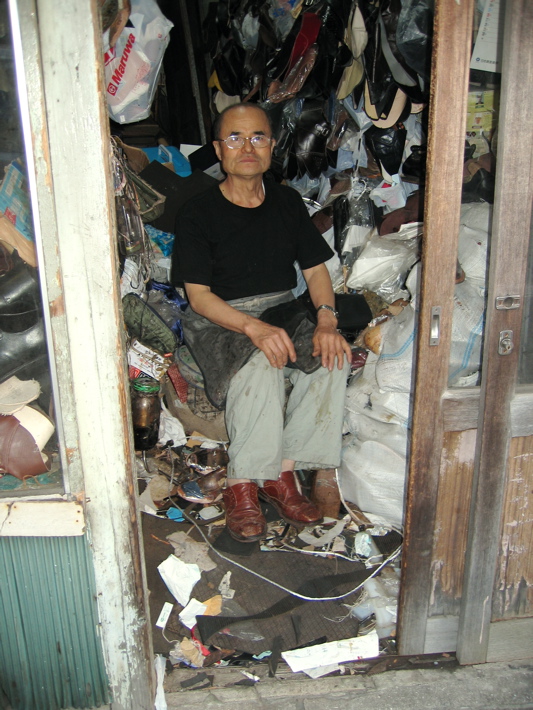 Meet Sadayuki Yamada, a real, live shoemaker. He is one of only two shoemakers in the 1 million plus metropolis of Kita Kyushu City in the north part of our island. I have driven by his tiny shop many times on my way home. The shop has always looked so intriguing (the store sign is an eye-catcher, too) that I finally stopped one day last week and took these pictures.
Meet Sadayuki Yamada, a real, live shoemaker. He is one of only two shoemakers in the 1 million plus metropolis of Kita Kyushu City in the north part of our island. I have driven by his tiny shop many times on my way home. The shop has always looked so intriguing (the store sign is an eye-catcher, too) that I finally stopped one day last week and took these pictures.
What a pleasant guy this 67 year-old Japanese artisan is. He just chattered away about his work. He’s been at it for nigh onto 40 years. Real shoemakers can rarely be found anywhere these days. Every pair of shoes Yamada-san makes is specially ordered by his customers. He charges about $170 a pair, but that includes his personal pattern-measurements of the customer’s feet, his hands-on forming, leather stretching, stitching and polishing. Compared to store-bought shoes, custom-fit shoes like Yamada’s make standing, walking, working and probably even dancing, too, a pleasure.
 You can see how close his working area is to the doorway of the shop. The shop door is only about 6 or 8 feet from the six-lane Japan National Highway #3. The rest of the little “hole in the wall” of a store is chock full of shoe-making tools, molds, cutting instruments, twine, leathers and samples of the numerous kinds of shoes he makes. Yamada-san also repairs shoes, but his main work is that of making custom-fit shoes for customers from all over Japan. He’ll travel all the way to Tokyo to measure a customer’s feet, then return to Kyushu to make the shoes. He said he loves his work. Shouldn’t we all? He takes pride in his work. Shouldn’t we all? His customers know that the quality surpasses that of store-bought shoes, otherwise they would not keep coming back to him after all these years.
You can see how close his working area is to the doorway of the shop. The shop door is only about 6 or 8 feet from the six-lane Japan National Highway #3. The rest of the little “hole in the wall” of a store is chock full of shoe-making tools, molds, cutting instruments, twine, leathers and samples of the numerous kinds of shoes he makes. Yamada-san also repairs shoes, but his main work is that of making custom-fit shoes for customers from all over Japan. He’ll travel all the way to Tokyo to measure a customer’s feet, then return to Kyushu to make the shoes. He said he loves his work. Shouldn’t we all? He takes pride in his work. Shouldn’t we all? His customers know that the quality surpasses that of store-bought shoes, otherwise they would not keep coming back to him after all these years.
I’ve never had a pair of real, live, artisan shoemaker-made shoes before, so I might just order a pair sometime next month. When you’re getting ready to go out this weekend, or to church on Sunday morning, and you put on your shoes, be thankful for the people (or the people who operated the machines) who made them. They made those shoes just for you! What would life be without shoes?
PS: “hole in the wall” ⎯ The Online Etymology Dictionary explains that the slang term for “small and unpretentious place” was first used circa 1822. In the early 1600s, “hole” meant “a small, dingy lodging or abode.” Perhaps back then “unpretentious” implied that nobody had cleaned for a few days.
